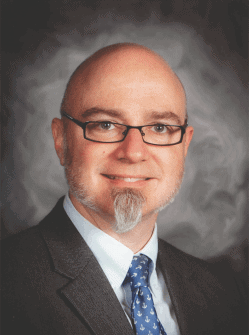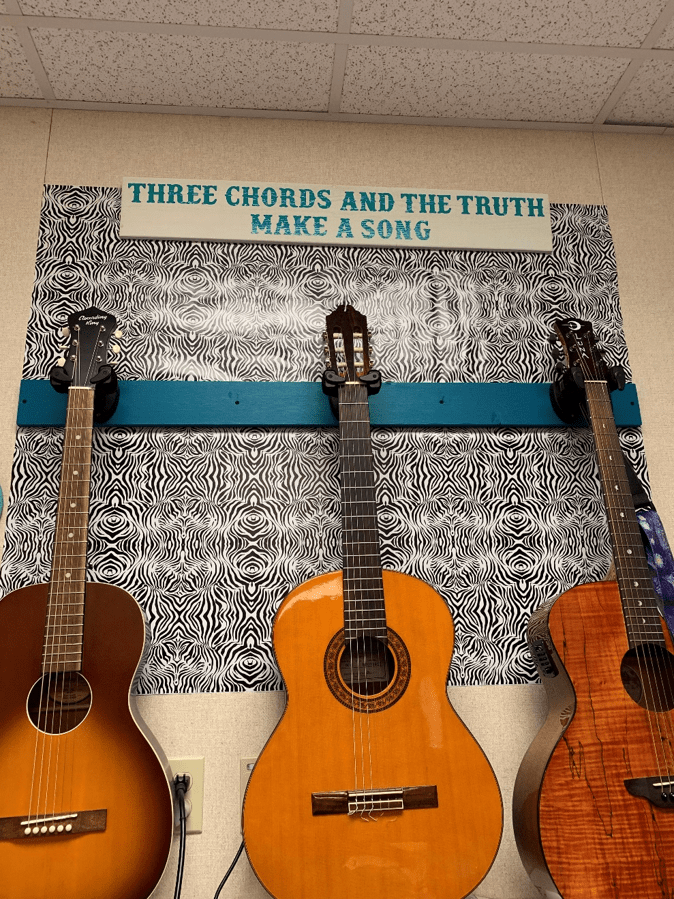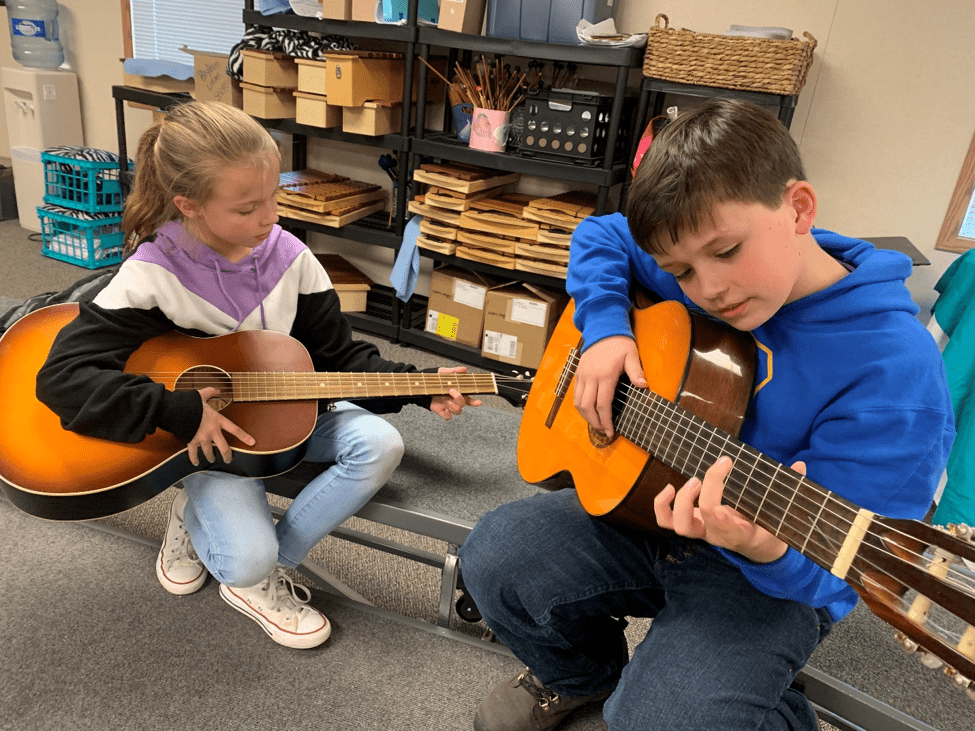/ News Posts / Guitar Class in the Evergreen State
Guitar Class in the Evergreen State
Number 42: The State of Washington
By Thomas Amoriello Jr.
NAfME Council for Guitar Education Chair
In this edition of “50 States of Guitar Class,” the NAfME Council for Guitar Education visits NAfME member Julia Gaul who is a Music Specialist at Grand Mound Elementary School in Rochester, Washington. Rochester is a rural community that is located twenty miles south of Olympia. The ukulele and guitar are becoming a popular alternative for use in the elementary setting, and she is proof that, “Where there’s a will there’s a way,” gaining access to plucked stringed instruments in her classroom. Teaching Guitar Workshops has guided her in her professional development, and we thank Ms. Gaul for sharing her experience with us.
Please tell us about your school and overall music program.
I teach approximately 520 students at Grand Mound Elementary School in Rochester, Washington, in grades 3–5 for 40 minutes every three days. I have built this program from no music program prior when I started here in 2005.
I currently teach ukuleles, xylophones, recorders, world drumming, music theory, and singing. I have two concerts per year that include a variety of repertoire. Through grants, I have added three guitars and five iPads to my classroom to use for music creation/composing and music centers. I am very interested in accumulating more guitars to be able add a guitar unit as well to my curriculum.
Please tell us about your own personal musical background growing up and your collegiate experience.
My mom and brothers played guitar, and I remember singing from the time I was a toddler. I grew up playing piano and singing in choir and in church. I took piano lessons as a child and earned a music scholarship singing in a women’s quartet at a junior college. I was involved in pageants and performed at fairs and festivals all around my community singing mostly country music. I spent many summers in West Virginia with a very large musical family singing lots of Appalachian folk songs and hymns on the front porch while my uncle played his guitar and my cousin played the banjo. When I went back to college at the age of 30, I majored in elementary education.
What obstacles did you face when you were first hired at your school? Now?
There was zero curriculum and no previous music program. I had to build it from scratch with little money and no instruments. I wrote grants, and I built a network of friends (music teachers) through NAfME and Washington Music Educators Association (WMEA), whom I contacted and observed.
I really focused on having my students fall in LOVE with music. We played singing games, and I started with them using a recorder because they were inexpensive. The local hardware store donated five-gallon buckets, and I bought drumsticks to teach drumming. I built relationships with my parents and community through performances. My parents held a raffle and raised $1,500 to purchase classroom instruments. In 2006 my school invested approximately $20K in classroom instruments and a keyboard. A few years ago, I received a $4,500 WMEA grant and a $1,500 booster grant. I used it to buy classroom ukuleles and iPads as well as materials and more instruments. I bought my first guitar also with that grant.
What kind of classes related to the guitar do you teach?
Ukulele unit—and I use my guitars in music centers. I’m working on getting more guitars so I can offer more whole class instruction.
What would you like to say to the non-guitarist music educator who is about to or interested in incorporating the guitar into their program?
JUST DO IT!!! It was on my bucket list to learn to play guitar. As a piano player, the scale of a guitar intimidated me because it didn’t seem very linear and was different from piano. When I saw the Teaching Guitar Workshop session in Nashville, I knew I just had to do it—AT THIS POINT, I DID NOT PLAY GUITAR!!! I signed up for weekly guitar lessons in January so I wouldn’t be completely clueless. Considering that I was very new to playing guitar, I learned so much and advanced my skills in that one week of intense instruction.
Do you have any success stories you would like to share about students?
When I came back from the Nashville GAMA workshop this last summer, I was all about “3 Chords and the Truth.” I encouraged my students to write songs when they were upset, happy, sad, angry, or feeling hopeless as a positive way to handle stress and issues in their lives as well as a way to document memories. I played guitar with my students as we wrote “Back to School” classroom songs about their teachers. Teachers and students LOVED this, and I got to work on my G runs.
I have seen such musical growth in many of my students! Not only are they using these songwriting skills to cope with feelings, but they are also encouraging their parents to do the same. My tag line to students when they want to complain or tattle is: “Write a song about it.” I absolutely love that music can be such a creative outlet for kids and adults alike.
What type of lesson plans have you done for your classes that may be unique?
After my music lesson, many days I offer ”free choice”: Students can use my iPads, ukuleles, piano, electric drums, xylophones, and GUITAR! This is great exposure for introducing guitar or for students to play/jam together.
What do you tell your talented students who are planning to pursue music or guitar studies in high school or college after they finish with you?
This is something that you can do for the rest of your life!! Music is a journey and a ride, not a destination as there is always so much more to learn.
“Music is a journey and a ride, not a destination as there is always so much more to learn.”
Do you have any networking or advocacy tools that have worked for you promoting your program that would help other educators?
I belong to WMEA and NAfME as well as WAMA (Washington Acoustic Music Association). I attend slow jams and my regional meetings and state/regional conferences.
What kind of future do you see for guitar in music education in Washington schools?
I hope that more teachers will choose to teach it and that it will be supported by the Office of Superintendent of Public Instruction’s (Washington) office. I believe the guitar is a very affordable way to teach musicianship and songwriting as well as have students accompany themselves while they sing.
Do you participate in any musical performances or activities outside of your public school teaching duties?
When I taught at the high school two years ago, I had “Coffee House-Open mic night” for my students and the community. It had a great turnout and was a safe place for people to get up and perform. I currently attend the Open Mic coffeehouse in the town in which I live, and I attend monthly slow jams through WAMA. I attend Bluegrass festivals and workshops when available. My son is a performing musician, and occasionally we will perform a duet at his gigs.
Any last thoughts to conclude our interview?
Making the decision to learn guitar has changed my life! I have met so many amazing people, and I have done something for myself that I never expected to do. I probably would not have enrolled in private lessons had I not signed up for the “Teaching Guitar Workshop.” I plan to continue my personal journey of learning of guitar as well as finding ways to purchase more guitars for my classroom and implementing it for my students.
Past “Guitar Class in 50 States” articles:
- Number 50: The Granite State (New Hampshire)
- Number 49: The Green Mountain State (Vermont)
- Number 48: The Mountain State (West Virginia)
- Number 47: The Hoosier State (Indiana)
- Number 46: The Mount Rushmore State (South Dakota)
- Number 45: The Pine Tree State (Maine)
- Number 44: The Badger State (Wisconsin)
- Number 43: The Constitution State (Connecticut)
- Number 41: The Pelican State (Louisiana)
- Number 40: The Beaver State (Oregon)
- Number 39: The Equality State (Wyoming)
- Number 38: The Empire State (New York)
- Number 37: The Old Line State (Maryland)
- Number 36: The Centennial State (Colorado)
- Number 35: The Bay State (Massachusetts)
- Number 34: The Sooner State (Oklahoma)
- Number 33: The Prairie State (Illinois)
- Number 32: The Hawkeye State (Iowa)
- Number 31: The Volunteer State (Tennessee)
- Number 30: The Palmetto State (South Carolina)
- Number 29: The Natural State (Arkansas)
- Number 28: The Tar Heel State (North Carolina)
- Number 27: The Magnolia State (Mississippi)
- Number 26: The Peace Garden State (North Dakota)
- Number 25: The Treasure State (Montana)
- Number 24: The First State (Delaware)
- Number 23: The Buckeye State (Ohio)
- Number 22: The Yellowhammer State (Alabama)
- Number 21: The Sunflower State (Kansas)
- Number 20: The Great Lakes State (Michigan)
- Number 19: The Lone Star State (Texas)
- Number 18: The Bluegrass State (Kentucky)
- Number 17: The Golden State (California)
- Number 16: The Show-Me State (Missouri)
- Number 15: The Keystone State (Pennsylvania)
- Number 14: The Last Frontier State (Alaska)
- Number 13: The Beehive State (Utah)
- Number 12: The Peach State (Georgia)
- Number 11: The Cornhusker State (Nebraska)
- Number 10: The Gem State (Idaho)
- Number 9: The Old Dominion (Virginia)
- Number 8: The Aloha State (Hawaii)
- Number 7: The Land of Enchantment (New Mexico)
- Number 6: The Sunshine State (Florida)
- Number 5: The Grand Canyon State (Arizona)
- Number 4: The Ocean State (Rhode Island)
- Number 3: The North Star State (Minnesota)
- Number 2: The Silver State (Nevada)
- Number 1: The Garden State (New Jersey)
About the author:
 Thomas Amoriello Jr. serves as the chair on the NAfME Council for Guitar Education and is also the former Chairperson for the New Jersey Music Education Association. Tom has taught guitar classes for the Flemington Raritan School District in Flemington, New Jersey, since 2005 and was also an adjunct guitar instructor at Cumberland County College, New Jersey, for five years. He has earned a Master of Music Degree in Classical Guitar Performance from Shenandoah Conservatory and a Bachelor of Arts in Music from Rowan University. He is the author of the children’s picture books A Journey to Guitarland with Maestro Armadillo and Ukulele Sam Strums in the Sand, both available from Black Rose Writing. He recently made a heavy metal recording with a stellar roster of musicians including former members of Black Sabbath, Whitesnake, Ozzy Osbourne, Yngwie J. Malmsteen’s Rising Force, and Dio that was released on H42 Records of Hamburg, Germany. The record released on 12-inch vinyl and digital platforms has received favorable reviews in many European rock magazines and appeared on the 2018 Top 15 Metal Albums list by Los Angeles KNAC Radio (Contributor Dr. Metal). Visit thomasamoriello.com for more information.
Thomas Amoriello Jr. serves as the chair on the NAfME Council for Guitar Education and is also the former Chairperson for the New Jersey Music Education Association. Tom has taught guitar classes for the Flemington Raritan School District in Flemington, New Jersey, since 2005 and was also an adjunct guitar instructor at Cumberland County College, New Jersey, for five years. He has earned a Master of Music Degree in Classical Guitar Performance from Shenandoah Conservatory and a Bachelor of Arts in Music from Rowan University. He is the author of the children’s picture books A Journey to Guitarland with Maestro Armadillo and Ukulele Sam Strums in the Sand, both available from Black Rose Writing. He recently made a heavy metal recording with a stellar roster of musicians including former members of Black Sabbath, Whitesnake, Ozzy Osbourne, Yngwie J. Malmsteen’s Rising Force, and Dio that was released on H42 Records of Hamburg, Germany. The record released on 12-inch vinyl and digital platforms has received favorable reviews in many European rock magazines and appeared on the 2018 Top 15 Metal Albums list by Los Angeles KNAC Radio (Contributor Dr. Metal). Visit thomasamoriello.com for more information.
Did this blog spur new ideas for your music program? Share them on Amplify! Interested in reprinting this article? Please review the reprint guidelines.
The National Association for Music Education (NAfME) provides a number of forums for the sharing of information and opinion, including blogs and postings on our website, articles and columns in our magazines and journals, and postings to our Amplify member portal. Unless specifically noted, the views expressed in these media do not necessarily represent the policy or views of the Association, its officers, or its employees.
Catherina Hurlburt, Marketing Communications Manager. January 23, 2020. © National Association for Music Education (NAfME.org)
Published Date
January 23, 2020
Category
- Ensembles
Copyright
January 23, 2020. © National Association for Music Education (NAfME.org)






